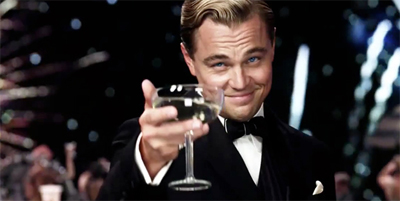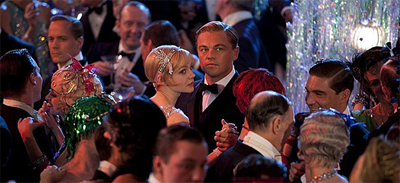The Great Gatsby feels like candy floss for the soul. A little of it is tempting, even appetizing. It was a curious texture, a strange sense of lightness, but also curiously heavy. Appealing to look at, and fun to pick at, it’s not something to be digested in large portions. The opening fifteen minutes of The Great Gatsby pop and sizzle, as Luhrman blends stylish visuals with an inability to keep anything still. The cameras, the actors and even the scenery seem to be moving to a beat – one occasionally intruding on the sound track. Such energy and vibrance is hard to resist, but it’s also exhausting – as much for the film as the audience. Once the movie settles into its own style and routine, it winds up feeling a lot like its protagonist. You’re not quite sure it’s really there.
Luhrman’s visuals are always interesting, and he has a solid ear for rhythm. Some of his music cues are a bit blunt (Rhapsody in Blue was a little on the nose, and Love is Blindness felt trite in the trailer), but there is a sense that Luhrman isn’t so much crafting a narrative story as he is constructing an audio-visual collage. It’s something the director has done quite often over his career, and his approach feels like a spiritual successor to the work that Michael Mann did with Miami Vice back in the eighties, favouring mood and tone over plot and character.
There is never a moment when The Great Gatsby doesn’t look splendid. Luhrman even manages to use 3D relatively well, particularly during the opening sequence where he stretches the image back into the screen to deepen the field of view. It’s a nice touch, and Luhrman is gleefully unashamed to fall back on familiar tricks like throwing confetti or snow (or letters) at the camera to remind the audience that he’s working on a 3D film. He even manages to avoid muting the colour too much, which is notable in a film as vibrant as this.
However, The Great Gatsby often feels too rich – too high in sugar but lacking in substance. For a film running two hours, the movie drags on in places, with the splendor of the scenery and the beauty of the cinematography doing little to disguise the fact that Luhrman’s sense of forward momentum stalls once Gatsby himself arrives on the scene. The movie establishes itself at a breakneck pace, offering rapid-fire introductions to the characters and the world they inhabit.
For all the beautiful composition and brightly saturated colours, those opening scenes feel surprisingly substantial. They aren’t necessarily perfect. They are dizzying and possibly nauseating, but they are also strangely intoxicating. One might wonder whether a two-hour film at that pace would simply be too much. But it has a vibrance and an energy that is strangely compelling. Luhrman manages to welcome us into a world that seems alive. It is stunning.
However, that sense of energy just evaporates once we meet Gatsby himself. It seems like Luhrman slows the film down quite a bit. It’s as if we’ve finally arrived at our destination, so Luhrman can relax a little bit. The film stumbles a bit, and never really regains its footing or its confidence as Luhrman takes us from a whirlwind tour of an early New York into a more intimate character drama. The problem is that Luhrman does one significantly better than the other.
We’re told that Gatsby himself is relatively reclusive and secretive, but the film opens him up completely relatively early on. We get the bare bones of his back story early on, and it’s elaborated on two more times over the course of the film. Neither journey into Gatsby’s past offers any truly essential detail that hasn’t already been effectively conveyed by Luhrman’s careful shot composition or DiCaprio’s reliable central performance. It feels redundant, and overly elaborate, for something which doesn’t add too much of value.
There’s an abundance of exposition, an over-reliance on dialogue, as the film runs through its second act. The momentum promised in the first few minutes is quickly lost, and even a few energetic car sequences can’t up the excitement. Of course, this sense of stalling and slowing might resonate with the movie’s closing meditation on Gatsby as a character, a striver always pushing forward even as fate’s inertia matches every step. It might be a solid thematic device, if those three car sequences didn’t feel like an attempt to re-energise the film. Even then, stalling the momentum on a film like this is a risky endeavour.
Luhrman typically works with good actors, but I’d be reluctant to argue that he’s an actor’s director. I struggle to think of any of his actors who have given career-best performances in his films. (Maybe John Leguizamo in Romeo + Juliet?) The quality of the performers in a Luhrman film always feels like an optional extra, an enhancement to the experience the director has in mind. However, when The Great Gatsby slows down, Luhrman finds himself relying on the cast to sustain the film.
Despite a solid effort from Leonardo DiCaprio, the roles aren’t written well enough to make the ensemble strong enough to carry the film. Joel Edgerton channels various degrees (if not quite multiple dimensions) of unpleasantness as Tom Buchanan, Carey Mulligan tries to find something to anchor Daisy, and Toby Maguire’s unchallenged mastery of “aw shucks”-ittude will only get him so far. Newcomer Elizabeth Debicki is really the only member of the ensemble aside from DiCaprio to make an impression. One assumes her dance training helped her find her balance here. She seems to be the only performer moving in rhythm to Luhrman’s film.
Perhaps the most damning aspect of the film’s middle section is the fact that even Luhrman’s attempts to be relatively low-key intrude over the dialogue and plot development. While various characters are busy making various heavily foreshadow-y observations, it’s often more compelling to play “guess the cover version or remix” with the film’s ambient musical score. You long for the return of those ridiculous parties, that nonsense collection of brightly-coloured imagery, because it feels more exciting than these takes on the characters created by F. Scott Fitzgerald.
My better half, far better read than myself, pointed out that Fitzgerald once got a peculiar piece of criticism from a publisher who had rejected the manuscript. They thought the character of Gatsby lacked substance. Fitzgeald politely pointed out that this was precisely the point, but very politely promised to make it exceptionally clear in the next draft of the book. Luhrman’s version of The Great Gatsby doesn’t have that problem. It’s very clear that Gatsby is a shallow creation.
However, everything else here is as well. That’s not a problem of itself, but it is when Luhrman decides to stop moving forward and instead to put weight on the characters and their world.
Filed under: Non-Review Reviews | Tagged: baz luhrmann, Carey Mulligan, Elizabeth Debicki, F. Scott Fitzgerald, Great Gatsby, Joel Edgerton, Leonardo diCaprio, Luhrman, New York City, Roaring Twenties, Shopping, tobey maguire |


























Yeah. You are over thinking things. This movie was visually stunning…and then what you said…and made me cry for two hours after viewing. It evoked passion I thought I’d lost.
Glad to hear that, Dee. Different strokes for different folks.